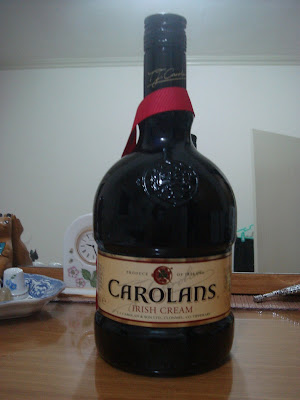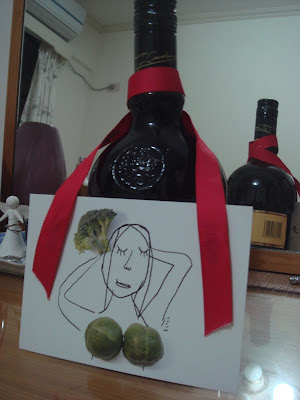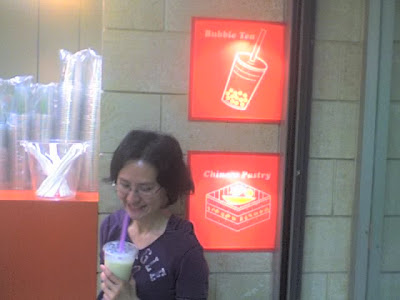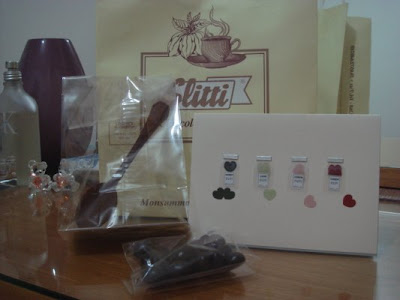Requested by Chin-Shuan Cultural & Educational Foundation (勤宣文教基金會) to write an introductory article for the programme of a forthcoming concert it is organising, I spent some time studying the background information about bands and musicians. I then came to know that all the three members of the Costa Rican music group Editus were conservatoire-trained and had once been affiliated with the National Symphonic Orchestra of Costa Rica.
In order to seek more details of Costa Rica’s Orquesta Sinfónica Nacional, I visited its website and consulted online references such as Britannica or CIA Word Factbook. I was so surprised when discovering that Costa Rica had constitutionally abolished its army in 1949 and part of the military budget was then re-allocated to support the orchestra.
Utmost awesomeness.
14 August 2008
07 August 2008
Irish Cream for the Seventh Night


It was the 'Seventh Night' (七夕 qixi, the Chinese version of St. Valentine's Day) again, the day when the cowherd boy and the weaver girl are reunited once every year.
Whereas earlier this year on the real St. Valentine's Day, Fanne found on her dressing table a pack of Italian Slitti Gran Cacao 73%, two days ago on the Chinese version she discovered a bottle of Carolans Irish Cream and a card.
I used to be a bit reserved but now appear to have a penchant for making arrangements for special occasions. Marrying a woman who had been waiting for me four years in the historic Church of the Holy Rude, where James VI was crowned King of Scotland, obviously has certain impacts on me.
Last week, upon seeing a drinking scene in a film on TV, Fanne was reminded of the days when we stayed in a flat in Murray Place, Stirling. Although most of the time we preferred having a pint of ale or a wee dram of Scotch in the local, sometimes we would pick up a bottle of Baileys from the off-licence downstairs and enjoy ourselves in the flat against the high-pitched, nasal sounds of Shanghai oldies.
She had been fancying a shot of Baileys. I just knew it, and was thus determined to prepare a seventh-night surprise for her
Somehow, Baileys, the commercial Irish whiskey and cream based liqueur, sold out, if now everywhere in Taipei, at least in the street where I live. I had no alternative but switched to an unfamiliar brand, Carolans.
It's indeed 'A Many Splendid Thing' to see her gazing at the bottle of Irish Cream and the card featuring a broccoli, the token of our troth. (The two brussels sprouts just happened to be there. I couldn't find a card that had only broccoli.)
I truly hope that in the near future we can go back to Scotland and take a shot of Baileys while having a bowl of crunchy and sweet broccoli.
19 July 2008
Regarding reader's submission
As requested, Yung-Yao contributed a post to my weblog after his trip to my sister Li-Wen's e-Tea House. He mailed me this 'essay' on 15th July, but as it took us a few days to proofread and copyedit the manuscript, it only went online yesterday.
Yung-Yao and I enjoy debating on any paradoxical, controversial issues all the time, which we believe helpful to establish stronger logic skills, enhance critical thinking and prevent Alzheimer's. However, sometimes we may make a mountain out of a mole hill and overplay our academic parts. The previous blog post may serve as a good example.
Rather than preparing on my own a post about his recalled 'pearl tea' experience with the photos he sent me, I suggested that he draft something in the fashion a correspondent contributes reports to a newspaper from a remote location, and I post it in my capacity as the owner/editor of the weblog.
It obviously worked quite well. We had much fun in reading and revising the manuscript as if we had been working on a non-peer-reviewed but intensive-editing-required essay.
Maybe I should urge some of my loyal readers, particular those whose mother tongue is not English, to contribute their views towards my life or short pieces about their own. As an academic experienced in marking students' reports/essays, as Yung-Yao describes, I shall do my best to offer them comments on language and writing style in return.
Yung-Yao and I enjoy debating on any paradoxical, controversial issues all the time, which we believe helpful to establish stronger logic skills, enhance critical thinking and prevent Alzheimer's. However, sometimes we may make a mountain out of a mole hill and overplay our academic parts. The previous blog post may serve as a good example.
Rather than preparing on my own a post about his recalled 'pearl tea' experience with the photos he sent me, I suggested that he draft something in the fashion a correspondent contributes reports to a newspaper from a remote location, and I post it in my capacity as the owner/editor of the weblog.
It obviously worked quite well. We had much fun in reading and revising the manuscript as if we had been working on a non-peer-reviewed but intensive-editing-required essay.
Maybe I should urge some of my loyal readers, particular those whose mother tongue is not English, to contribute their views towards my life or short pieces about their own. As an academic experienced in marking students' reports/essays, as Yung-Yao describes, I shall do my best to offer them comments on language and writing style in return.
18 July 2008
Reader's submission:
A discovery trip to e-Tea House, New York
by Dr Yung-Yao Lin

(Yung-Yao and Li-Wen at e-Tea House)
Readers of Principal Wei's Weblog may or may not know that Wei has a sister, who lives in New York, USA. After finishing her high school and college, she worked in a bank for two years. One might think that it is a good job for a girl, stable and good paid. Being the only sister of Wei, Li-Wen, however, has a greater dream – opening and branding a new teahouse in downtown Manhattan. Since I was staying in New York for a couple of weeks, I decided to visit her teahouse. Not until then did I realise that she started having this dream while she was studying in the college. During that time, she took a part-time job to work in a teahouse and support her expenses.
Within the years of her part-time employment in a teahouse, Li-Wen developed a business plan and would like to make it come true. She thought of the name of her teahouse, designed the interior decoration and even registered a domain name in order to advertise her teahouse on the Internet. Eventually, she gained support from her aunt and uncle to make sufficient start-up fund. She then quit her job and found a good location near the influential Wall Street.
On July 4th, I went to Li-Wen’s teahouse with my university classmate, Ho-Yi, who is working as an architect in New York. The address is 29 John Street, not far from the Fulton subway station. As Wei didn't disclose the secret of my visit, Li-Wen was very surprised to see me. The last time we met was on Principal and Fanne's wedding in Scotland about a year ago. I was the best man and she was bridesmaid. Li-Wen greeted us excitedly and introduced us all products of her teahouse. I ordered my all-time favourite: Pearl Milk Tea. I forgot what Ho-Yi ordered though.
After leaving Taiwan for so many years, my hope for drinking authentic Pearl Milk Tea in London China Town has gradually died down. I concluded that any characteristic food or drink once leaves its motherland will never be the same. I have to say, however, I might be wrong. After sipping Li-Wen's Pearl Milk tea, my taste buds were able to recall my memory of happiness. Nicely blended milk and tea, ice-cold, combined with 'pearls', which are dark and partly transparent jelly-like tapioca balls. Having these chewy 'pearls' in the mouth is a wonderfully pleasant sensation that goes so well with milk tea. Li-Wen offered us some rice crackers, not home made, yet very nice, too. We happily chatted and joked. She also told us bits and bobs about her less-than-two-month-old teahouse.
When was last time talking and joking happily with my friends and each of us had a cup of Pearl Milk Tea? Towards finishing my drink, I tasted a hint of nostalgia.
At this point, I believe many readers will have agreed with me – the brother and sister of the Chens are the same type. They are not afraid of making dreams because they share the same revolutionary elements in their blood. To congratulate them for having made big steps, I sincerely wish them all the best on their own paths.

(Ho-Yi, classmate from Botany NTU, Class of 98, and, in her own words, a single girl seeking romance.)
Editor's note: Dr Yung-Yao Lin is currently a postdoctoral fellow in a research institute in Cambridge, UK. He is a long-term and passionate reader of Principal Wei's Weblog. He has appeared several times in many articles on Wei's blog. Since he has not a bolg of his own, he has decided to become a freelancer and contribute to Principal Wei's Weblog whenever appropriate.
05 July 2008
Cicadas revisited
We went hiking at Elephant Mountain again and managed to record this lo-fi video clip in the rain. How wonderful it was to meet these cicadas two weeks later, although they were probably not those which we had encountered. The latter may have well breathed their last as adult cicadas have a rather short life span.
We had a light rain shower on our way up the hill and thus the video looks dark and dingy. In addition, as I'm not a cameraman from the National Geographic or the Discovery Channel, apart from the insect buzz and the soft pitter-patter of the rain, there is certainly no cicada in the video.
Luckily the shower stopped before sunset, so we could watch, with a scattering of lights gleaming through the haze, the sun sinking down behind the ridge.

23 June 2008
First wedding anniversary

Time flies at twice the speed of my life; suddenly it's our first wedding anniversary. Whereas two days ago on the summer solstice, which by chance fell on a Saturday this year, we went for a hike and surprisingly retrieved the long-lost cicada song, what are we supposed to do on this supposedly special occasion, which unluckily comes about on the first working day of the week?
I gave Fanne a card, a coffee spoon made of Slitti's extra-bitter chocolate, with which she can stir sugar and milk in her coffee while it dissolves, and some Arabica coffee beans coated with Slitti's pure, extra-dark chocolate. She invited me a meal at an Italian-style restaurant, Pasta West East.
So it was our paper anniversary.


(close look at Slitti's chocolate spoon and coffee beans coated with chocolate, images from Lucullian Delights, the author of which obviously happens to share with me the same taste in cioccolato)
22 June 2008
Cicadas alive and singing

(image from this blog. Visit to see more.)
I just cannot remember the last time I heard cicadas singing in urban areas in Taiwan. In Keelung, the harbour town where I was born and brought up, cicadas used to strike up their reverberating chorus, celebrating the arrival of summer. In Taichung, the sun-drenched city where I spent three years in senior high school, their thunderous songs helped me stay awake in numerous soporific classes when days became longer. However, in Taipei, the capital where I live now, they seem to disappear in summer.
I once thought cicadas were all killed and extinct in Taipei. But fortunately, they are actually all alive and singing, though not in the city centre.
Fanne and I went hiking at Elephant Mountain (象山 Xiangshan, not a mountain indeed, just a 183-metre-high hill) yesterday afternoon. Surprisingly, virtually just a stone's throw away from Taiepi 101, the so-far-tallest building in the world, we heard an exciting hubbub of cicada singing, the nostalgic noise which once resounded countless summer days and nights in my childhood and adolescent years.
It was absolutely stunning. These tiny critters, with their amazing acoustic talents, worked together to form a sound backdrop which would require hundreds of buzz saws and Egyptian mizmars operating simultaneously to produce in a studio.
Ear-piercing as cicada song was, in the hill we went on basking in the unforgettable sound of summer.
Hence, it turns out that in Taipei, the capital where I live now, cicadas are still chorusing in the hills in summertime, looking towards the city centre.
16 June 2008
BBQ and the qilaut frame drum


(images courtesy of Maolun)
I went to a BBQ gathering organised by Botany NTU, Class of 1998. Although I am actually a member of the class of 1997, and thus was once their 'male senior schoolmate' (學長 xuezhang), a Taiwanese expression which may sound awkward and verbose in English, I am quite acquainted to some of them and would sometimes join the gang.
At one point, after roasting some succulent water bamboo stems (茭白筍 jiaobai sun, not really bamboo but a species of wild rice) for a while, in response to a conjuring sound suddenly pounding in my head, I started beating a paper plate with a water bamboo stem like an Inuit from Far North striking a frame drum.
Apart from my far-fetched association of food and a plate with an instrument, what is really worth noting is that different from the Uzbek doira, which is played with both hands almost on every bit of the drum, the Inuit qilaut is only beaten from the back by one stick on its frame instead of the skin.
Have a look at this picture to see how an Inuit drum dancer plays her instrument and you'll probably appreciate the whole scenario.

(image from Nick Russill's album of Greenland Faces)
It appears that teaching World Music has already had certain impact on my life.
10 June 2008
Sa Dingding: Overstated or false publicity?
The winning artists of BBC Radio 3 Awards for World Music 2008 have been announced at a ceremony in London on the 10th of April. The winner of the Aisa/Pacific category was Sa Dingding (薩頂頂), a female artist of Chinese nationality, born in Inner Mongolia to a Mongolian mother and a Chinese father. It was her major label international debut album Alive, release by Universal Music in 2007, that won her the trophy.
I definitely have no doubt of her musicality, vocal techniques, creativity, image and so on, nor do I have the slightest interest in discussions about the controversy over her appropriation of Tibetan music or over issues such as 'ethnicity', 'authenticity' or whatever pedantic criticism that might be raised when dealing with 'world music'. Quite the other way around, I just wallow in the rich fabric of sounds of her impressive voice and all the electric tones.
However, firstly, I don't think the obviously ancient Sanskrit lyrics were written by herself, and secondly, I am sceptical about her knowledge of Sanskrit and wonder how and to what level she has studied Sanskrit.
On the BBC website, it goes:
Her recordings make full use of impressive linguistic abilities, featuring lyrics she has written in Mandarin, Sanskrit, Tibetan and the near-extinct Lagu language, as well as an imaginary self-created language which she says is generated from the emotions evoked by the music. (emphasis mine)The lyrics of 'Alive (Mantra)', one song from the winning album, are said to be the Sanskrit Vajrasattva Mantra (follow the link for more details of this mantra). It is the chanting in this track that raises my suspicion.
Upon hearing this piece one day over the Internet, I was aware that what she intoned was actually the transliterated version of Vajrasattva Mantra in Tibetan, but not the original Sanskrit text. Even worse is her mispronunciation of some Tibetan words, which is a result of reading the modified Tibetan version through the transliteration of Tibetan into Chinese characters.
Vajrasattva Mantra is well known among many Chinese-speaking Buddhists, who practice Tibetan Buddhism but don't actually read Tibetan texts. Therefore, a text composed of Chinese characters roughly corresponding Tibetan pronunciation has long been prepared and there are a range of CDs of either pure recitation or melodised chanting against new-age-style back ground music available for them. It is not difficult to tell that Sa Dingding's Vajrasattva Mantra is Tibetan, and indeed mispronounced, rather than Sanskrit when comparing her recitation with the Sanskrit text and the Tibetan transliteration (follow the links and scroll down).
Moreover, I noticed later that 'Alive (Mantra)' is not the only case in the album. 'Tuo Luo Ni', another piece based on the Sanskrit Karandamudra Dharani Sutra (again follow the link and scroll down), is actually the Chinese-transliterated text as well.
I am absolutely not against her adaptation of the Chinese-transliterated in her musical work. The point is that if it is the Tibetan mantra, then it is Tibetan, not Sanskrit; if it is Chinese transliteration, then it is not the so claimed Sanskrit. It is simply wrong, particularly when introducing something from a distant culture into the global mass market, to mislead the audience.
If she had studied Sanskrit, as she claims or as reported in the media, she would have sung the mantra in proper Sanskrit. She probably not dare to explain in the liner notes or when interviewed that the sounds of Sanskrit mantra or sutra are all Chinese, but I suppose that certain department or production team from Universal Music should have made some research before launching the album.
It's a pity. I enjoyed the music per se but I despise overstatement or false publicity, and besides, I feel sorry for the person who was misled to prepare those words on the BBC website.
05 June 2008
Long time no see, Katoh-san
In the virtual world on the Internet we not only encounter new challenges but also retrieve old memories. Pretty much like a small piece of paper which may lead a genealogist to unfold more about a particular historic figure's life accounts, an entry on a weblog, on a search engine results page or on a list of whatever stuff from the Internet may direct us through umpteen web sites to locate a person who was once quite active in our life but whom somehow we lost contact with.
Katoh Masahiro (加藤昌弘), a colleague from Stirling Media Research Institute, whom I called Katoh-san (Mr Katoh in Japanese), found my article about old Shanghi pop on the online database of the Cambridge University Press. The serendipitous finding, with the help of Google's unrivalled searching capacity, showed him the way to my weblog.
It's amazing. Katoh-san not only left a comment on my blog but also wrote a post dedicated to me on his.
Prost! To the Internet and to Google.
Katoh Masahiro (加藤昌弘), a colleague from Stirling Media Research Institute, whom I called Katoh-san (Mr Katoh in Japanese), found my article about old Shanghi pop on the online database of the Cambridge University Press. The serendipitous finding, with the help of Google's unrivalled searching capacity, showed him the way to my weblog.
It's amazing. Katoh-san not only left a comment on my blog but also wrote a post dedicated to me on his.
Prost! To the Internet and to Google.
Subscribe to:
Posts (Atom)




